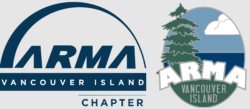Please Note: Registration closes at midnight, April 21, 2016.
Please join us for our annual one-day conference, Managing Electronic Records.
Come and hear about how one BC Regional District cleaned up their shared drive records ; the new Canadian General Standards Board draft revision of ‘Electronic Records as Documentary Evidence’, a document which is crucial when scanning ; electronic records stored in the cloud and available Canadian data storage centres ; and, of course, EDRMS (Electronic Document Records Management Systems). Plus lots of time to network and create new contacts!
When
Friday, April 29, 2016
Time
8:45 am until 4:00 pm
Where
Vancouver Island Conference Centre, River Room, 101 Gordon St, Nanaimo, BC V9R 5J8
Cost
$100 ARMA Members ; $125 non-members
Schedule
8:45 – 9:00 Registration
9:00 – 9:10 Introduction and MC – Bruce Smith
9:10 – 9:30 eRecords Issues, Questions, Concerns on the Whiteboard – Ken Oldenburger
9:30 – 9:50 CAN/CGSB 72.34: New Draft vs. Previously Approved – Ken Oldenburger
9:50 – 10:10 CAN/CGSB 72.34: Implications of the New Draft – Dave Young
10:10 – 10:30 Calories & Caffeine
10:30 – 12:00 Shared Drive Restructure (Case Study – Anne Rathbone and Kris Boutilier (Sunshine Coast Regional District)
12:00 – 1:00 Lunch (Provided)
1:00 – 2:00 Ditch Document Chaos in 2016 – Richard Hyde
2:00 – 2:30 Calories & Caffeine – Sponsored by Ricoh Canada
2:30 – 3:30 Seizing Opportunities in the Cloud – John Weigelt (via webcast)
3:30 – 4:00 eRasing the Whiteboard – Ken Oldenburger
4:00 Closing – Dave Young
Session Descriptions
eRecord Issues, Questions, and Concerns on the Whiteboard – Ken Oldenburger will facilitate a time to air your concerns, questions and issues with and about electronic records and electronic records management. We won’t try to answer them at this time, but will come back to them at the end of the day.
CAN/CGSB 72.34 – New Draft vs. Previously Approved and Implications of the New Draft CAN/CGSB 72.34 – Dave Young and Ken Oldenburger will lead two back-to-back sessions as informal reports and discussion time on how the so-called “Scanning Standard” is being rewritten. The latest draft of CAN/CGSB-72.34-2015 Electronic Records as Documentary Evidence will be provided to attendees before the conference. This document has the potential to reframe electronic records management in Canada.
Shared Drive Restructure – A Case Study – Sunshine Coast Regional District – Anne Rathbone and Kris Boutilier – With 44,500 folders containing 465,000 files in its shared drive and the volume growing daily, the staff at the Sunshine Coast Regional District (SCRD) struggled with finding files, with dealing with information silos, and with duplicating documents that already existed. Records Management and Information Technology (IT) staff collaborated to spearhead a shared drive restructure project to gain control of the SCRD’s electronic documents. From developing the RFP (Request For Proposals) to implementing all of the changes, this case study will show how to undertake such a project, including what worked and what could have been improved.
Ditch Document Chaos in 2016 – Richard Hyde will lead a frank discussion on how far we’ve deviated from good organizational practices once we started sharing documents in computer structures. Are we any better at finding documents than when we housed paper documents in file folders with precise labels? Scanning paper documents and saving email attachments has added to the chaos and confusion.
Come and hear how an EDRMS system can help you organize and find and retrieve documents. But is that enough? No. Governance from the point a document enters your organization to the final disposition of the document once it has reached its destruction date are equally important, and will protect your business and make it more efficient. Examples of real customer use cases, best practices, and pitfalls to avoid when pursuing a document or records management project will be presented.
Seizing Opportunities in the Cloud – John Weigelt – The 4th industrial revolution is having a dramatic impact on all aspects of our lives and the world around us. The Internet of Things, Big Data and Cloud computing are not only bridging between virtual and physical worlds, they are also providing amazing new insights into the world around us. While this revolution presents tremendous opportunity, many organizations are reluctant to adopt new approaches to business as a result of privacy and security concerns. Join John as he discusses the technology transformations that are behind the 4th industrial revolution and how organizations can leverage these technologies with confidence.
“eRasing the Whiteboard” – A final review of the concerns, questions and issues that were raised at the start of the day. Items that have not been addressed will be recorded and may be used for future events and sessions.
Biographies
Dave Young is the Records Management Archivist for the University of Victoria. Prior to attaining that position in 2013, he was a records management consultant for many public sector agencies. He will be serving as President of ARMA Vancouver Island for the 2016/17 administrative year.
Ken Oldenburger has been involved in records management for twenty years. These services have involved: designing and amending records classification systems and retention schedules, and physically and electronically implementing these systems ; drafting information governance policies and procedures ; creating needs assessments and strategic plans ; providing training and advice ; and, of course, filing. Ken has worked for provincial, territorial, municipal, regional and First Nations governments as well as universities and private corporations. Ken is a founding member of the Vancouver Island Chapter of ARMA International (www.armavi.org).
Anne Rathbone, CRM, has a background in Chemical Sciences (specializing in Pulp and Paper) along with 20 years’ RIM experience in local government. She is the Sunshine Coast Regional District’s Records Management Technician and was one of the leaders on the SCRD’s shared drive project. She developed the RFP and worked closely with the consultant on the new shared drive framework. In addition, she provided the training for all staff on the new shared drive and is responsible for maintaining the integrity of the new framework. She has worked closely with the ARMA Vancouver Chapter, serving as Education Chair for several years, and has helped to bring workshops and conferences to interior BC communities.
Kris Boutilier has worked for 21 years in IT with the Sunshine Coast Regional District. He has seen first-hand a government organization grow from dozens to hundreds of users, storage capacity increase from hundreds of megabytes to terabytes and the exponential growth in information exchange and hoarding made possible by the adoption of the Internet in the workplace. Coming from the IT side of the fence, he brings an alternate perspective to the topic of electronic file management, particularly the increasing conflict between the desire of Records Managers to discard and users’ expectations that IT will always preserve.
Richard Hyde, a Solutions Consultant with Ricoh Canada, has over 30 years’ experience in Business Information Technology. He is a strategic and design lead in Ricoh’s Professional Services division supporting Government and Commercial Accounts. Richard develops in-depth working partnerships with key and strategic customers at all levels (staff, managers, C-level) to support customers’ business objectives and risk management strategies. Richard is an SME (Subject Matter Expert) for many of Ricoh’s solutions such as enterprise scanning, content management, and workflow, to name a few. Richard’s career has included assignments with Canon, Xerox, and Ricoh. He has extensive experience working within First Nations, Public Sector, Manufacturing, Retail and Financial verticals implementing enterprise software solutions and providing professional services. Richard focuses on delivering positive business outcomes, efficiencies, risk mitigation and automation of business processes to his customers.
John Weigelt is the National Technology Officer for Microsoft Canada and is responsible for driving Microsoft Canada’s strategic policy and technology efforts. In this role, Mr. Weigelt is the lead public advocate within the company on key issues such as the development of national technology policy and the use of technology by the private and public sectors, including leading Canadian outreach for economic development, innovation, environmental sustainability, accessibility, privacy and security. Mr. Weigelt is also responsible for the development and implementation of strategies which strengthen the company’s relationships with the Canadian technology industry at large.


